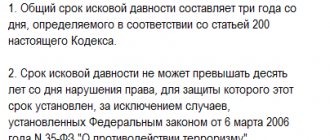Home / Bankruptcy / Bankruptcy of legal entities
Back
Published: 02.09.2019
Reading time: 4 min
0
1024
Chapter 12 of the Civil Code is devoted to the issue of expiration of the statute of limitations in terms of debt collection. Based on the provisions of Art. 195 of the Civil Code, the statute of limitations is understood as the time period during which the creditor has the right to demand the return of funds from the debtor. These are the deadlines within which the creditor can go to court to protect violated rights. The creditor in this case can be absolutely anyone: it can be a bank, a management company, a legal entity, etc.
- Limitation periods
- Calculation order
- Is it possible to collect a debt after the statute of limitations has expired?
As a general rule, if a creditor does not have time to go to court within the allotted limitation period, and obligations to him remain outstanding, then the debts of an individual or legal entity must be written off regardless of their size.
How is the statute of limitations calculated?
The issue has implications for debtors and creditors. The agreement signed by the parties indicates by what date the debt must be paid. If the debt is not repaid on time, then the next day is the beginning of the accrual of penalties.
The time period for sending an application to the judicial authorities is three years (Article 200 of the Civil Code of the Russian Federation).
3 cases for resetting the deadline
- The credit institution sends demands for payment of debt.
- The debtor acknowledges the existence of a debt.
- The borrower does not pay for some time, and then deposits a certain amount of money.
If the borrower does not acknowledge the existence of the debt, then zeroing does not occur.
For example, the debtor responds to the creditor’s claim, but does not acknowledge the existence of a debt.
It is the actions to recognize the legality of the claim that matter. For example, a debtor sends an application to a credit institution to change the terms of debt repayment. Explanations on what circumstances reset the period were given by the Supreme Court (clause 20 of Resolution No. 43). Repayment of part of the debt also does not mean that the borrower has fully accepted the claim.
Important! If the lender does not bother the borrower, this does not mean that the amount of debt remains the same. For each day of delay in payment, fines are assessed.
For an accurate calculation, we recommend that you consult a lawyer.
Collection and statute of limitations
What generally happens in a situation when a person has a loan debt and payment is not received?
A bank or microfinance organization usually does this:
- The bank or other creditor first warns the person about the beginning of the delay and tries to find out the reasons for the lack of payment.
- At the second stage, collectors are involved who work with creditors under an agency agreement. They are responsible for collecting overdue debts, but the bank is still considered the main creditor.
- At the third stage, usually the overdue loan or microloan is sold to a collection agency under an assignment agreement. This means that collectors are now becoming the new creditor. They receive all the powers of the previous creditor: the right to claim debt, penalties, interest and other charges.
But a bank or microfinance organization can immediately sell the debt to collectors. Engage a collector-agent or sell the debt - this choice depends on the internal policy of the creditor.
- The last stage is going to court. The main creditor and collectors have this right. Then, based on a court decision, forced collection begins. Only the creditor first needs to contact the bailiffs and initiate enforcement proceedings.
Accordingly, before the start of the court case, the debtor does not have the right to declare the statute of limitations. That is, you, for example, cannot, in response to claims from creditors or collectors, state that the statute of limitations has already expired. This fact must be confirmed in court.
If the creditor filed a lawsuit earlier than the specified period, the debtor does not have the right to invoke the statute of limitations.
Debt collection by bailiffs is carried out according to norms No. 229-FZ. In particular, bailiffs carry out:
- search for property and the debtor himself;
- seizure of property;
- seizure of bank accounts (including a credit card account);
- monthly forced collections from the debtor’s income in favor of the creditor.
The following does not apply to cases based on writs of execution:
- laws on the protection of personal data - bailiffs can find personal data of the debtor and work with them in the interests of collectors;
- Art. 196 of the Civil Code of the Russian Federation on the limitation period. That is, statutes of limitations do not apply to enforcement proceedings.
If your creditor went to court after the statute of limitations had expired, but you did not file a counter-objection, he has the right to collect the debt from you. It all depends on your reaction.
There is also a rule that stipulates that the creditor must comply with deadlines in enforcement proceedings. It works like this:
- If the search for the debtor’s property yields nothing, he has no permanent income, and collection on an ongoing basis is impossible, the enforcement proceedings are closed.
- Next, the creditor is given six months of “vacation”; and only after the expiration of this period will he be able to initiate production again.
- It is important that the creditor does not miss 3 years, since after such a break the debtor will be able to object with a statement about the expiration of the statute of limitations.
In principle, enforcement proceedings can be resumed indefinitely. But the debtor has the opportunity to get rid of debt claims by applying to the Arbitration Court or the MFC for debt write-off. He declares himself bankrupt and safely gets rid of any claims.
What are the consequences when the statute of limitations on debts of individuals is missed?
We warn you that the most unpleasant consequences await the lender. The court may refuse the demands.
Important! The judge will not check whether the time for filing a statement has been missed or not if the defendant’s statement is missing.
The possibility of winning the case increases if the debtor does not declare that the time to go to court has expired.
As a general rule, statements from third parties that the time to collect the debt has expired will not be accepted. But there are exceptions to the rule. A third party may declare the deadline to expire if the outcome of the dispute affects its interests.
The law does not specify exactly how to express statements. Therefore, it is possible to submit a written statement or make an oral demand during the hearing process.
4 cases for unlimited appeal to court
- issue a deposit made with a credit institution;
- protect non-property rights;
- compensate for damage caused to health and life;
- return property held by another person.
Special limitation periods for debts of legal entities and individual entrepreneurs
According to Article 195 of the Civil Code of Russia, the limitation period is the period for protecting a violated right in court. As a general rule, the statute of limitations is 3 years. The limitation period begins from the day when the person whose right was violated learned about this violation or should have learned about such a violation. Thus, the possibility of protecting one’s right in court depends on whether the deadline for applying for protection of the right has been missed. Is it possible to restore the statute of limitations? Article 205 of the Civil Code establishes that the statute of limitations can be restored by the court in exceptional cases, when it recognizes a valid reason for missing the statute of limitations due to circumstances related to the personality of the plaintiff; the violated right of a citizen is subject to protection. It follows from this that the limitation period missed by a legal entity, regardless of the reasons for its omission, cannot be restored. In addition, Part 2 of Article 196 of the Civil Code of Russia sets a limitation period of 10 years, that is, it is impossible to restore the right in court 10 years from the moment the person learned of the violation of the right. It should be noted that the limitation period does not apply to some cases specified in the law, listed in Art. 208 of the Civil Code of the Russian Federation, for example, when intangible benefits were violated, such as honor, dignity and business reputation, to the owner’s demands to eliminate violations of his rights. If the defendant in court declares that the plaintiff has missed the statute of limitations, the court has the right to refuse the plaintiff’s claim without considering the dispute on its merits. If the debtor gives a written response to the claim and promises to pay the debt later than previously provided for by the obligation, then the limitation period is interrupted and then begins again. For certain types of claims, laws may establish special limitation periods, both shorter and longer than the general period. For example, shortened limitation periods are provided for by transport legislation (Article 797 of the Civil Code establishes a limitation period of 1 year for claims arising from the transportation of goods). Other special limitation periods: - The limitation period for claims for the protection of honor, dignity and business reputation presented in connection with the dissemination of information in the media is 1 year from the date of publication of such information in the media, - The limitation period for claims related to with the evasion of a party to a transaction from notarization or state registration of the transaction, is 1 year, - The statute of limitations for a request to recognize a voidable transaction as invalid and to apply the consequences of its invalidity is 1 year, - The decision of the meeting can be challenged in court within six months from the date when a person whose rights were violated by the decision, learned or should have known about it, but no later than within two years from the day when information about the decision became publicly available to participants in the relevant civil law community - When selling a share with a violation of the pre-emptive right to purchase, any other participant in shared ownership has the right, within three months, to demand in court the transfer of the rights and obligations of the buyer to him; - A statement of claim for claims related to defects in the goods can be filed within two years (clause 2 tbsp. 477 of the Civil Code of the Russian Federation), - a creditor who was not notified in writing before the transfer (lease) of an enterprise to a buyer (lessee) about its sale (lease) by one of the parties to the sale (lease) agreement of the enterprise has the right, within a year from the day when he learned or should have learned about the transfer (leasing) of an enterprise by the seller (lessor) to the buyer (tenant), demand either termination or early fulfillment of the obligation and compensation by the seller (lessor) for the losses caused by this, or recognition of the sale (lease) agreement of the enterprise as invalid in full or in the relevant part (Articles 562 and 657 of the Civil Code of the Russian Federation); — The statute of limitations for claims brought in connection with inadequate quality of work performed under a work contract is one year, — The claim of the check holder against the drawer, avalists, endorsers can be brought within six months from the date of expiration of the period for presenting the check for payment, and recourse claims on claims of obligated persons against each other are extinguished with the expiration of six months from the day when the corresponding obligated person satisfied the claim, or from the day the claim was brought against him (clause 3 of Article 885 of the Civil Code of the Russian Federation); — The limitation period for claims arising from a property insurance contract, with the exception of a liability risk insurance contract for obligations arising from causing harm to the life, health or property of other persons, is two years (Clause 1 of Article 966 of the Civil Code of the Russian Federation); — Claims for claims arising in connection with the collision of ships and the implementation of a rescue operation can be brought within two years (clause 5 of Article 164 of the Russian Federation Code of Internal Affairs) — Claims for compensation for damage to the environment caused by violation of legislation in the field of environmental protection environment, can be brought within twenty years (Clause 3 of Article 78 No. 7-FZ “On Environmental Protection”) - a claim to apply the consequences of imposing on the broker the obligation to purchase securities at his own expense from the client at the request of the client and at reimbursement to the client of all expenses incurred in carrying out these transactions, including expenses for paying for the services of a broker, depository and exchange, or imposing on the broker the obligation to compensate the client for losses caused in connection with the conclusion and execution of contracts that are derivative financial instruments, including all expenses incurred by the client when carrying out these transactions, including expenses for paying for the services of a broker, exchange, including as a result of the client’s unlawful recognition as a qualified investor, may be presented by the client within one year from the date of receipt of the corresponding broker’s report on completed transactions (clauses 5, 6 and 8 art. 3 No. 39-FZ “On the securities market”); — A claim for the application of the consequences of a transaction by a manager in violation of the requirements for the right, when carrying out securities management activities, to acquire securities intended for qualified investors and to enter into agreements that are derivative financial instruments intended for qualified investors, only on the condition that the client is a qualified investor can be presented by the client within one year from the date of receipt of the relevant manager’s report (Article 5 No. 39-FZ “On the Securities Market”); — The non-renewable limitation period for declaring an issue (additional issue) of issue-grade securities, decisions made by the issuer, the Bank of Russia and (or) another authorized body or organization and related to the issue of securities invalid is three months from the date of state registration . At the same time, a requirement to invalidate the issue (additional issue) of equity securities, the issue procedure of which does not provide for state registration of a report on the results of their issue (additional issue), may be submitted to the court before the issuer discloses information about the start of the placement of such securities (clause 9, Article 26 No. 39-FZ “On the securities market”); — When selling shares of a JSC in violation of the preemptive right of acquisition, any shareholder of the JSC and (or) JSC, if the charter of the JSC provides for the preemptive right to acquire JSC shares, has the right, within three months from the moment when the shareholder or JSC learned or should have learned about such a violation, demand in court the transfer of the rights and obligations of the buyer to them (clause 3 of Article 7 No. 208-FZ “On Joint-Stock Companies”). The special limitation periods indicated above are not an exhaustive list. The laws provide for other special limitation periods. You should not wait for the statute of limitations to expire; contact our specialists for timely protection of the violated right in court.
Is it possible to restore the time to file a claim?
It is possible to restore time, but you will have to work hard to do this. It is necessary to collect evidence that the time was missed for valid reasons. Supporting documents must be submitted for confirmation. For example, a conclusion from specialists from a medical institution about a disease that prevents going to court.
It is possible that the lender will repay the debt. Then he finds out that the return period has expired and declares this. In this case, the borrower will not be able to demand the money back.
Length of the statute of limitations for debt
The general statute of limitations, regardless of the nature of the obligation violated by the person, is 3 years. This means that within 3 years from the moment the debt was due to be repaid, the creditor has the right to file a lawsuit against the borrower. The expiration of this period does not mean that the court will refuse to accept the claim for consideration. The claim will be considered in the usual manner until the defendant claims that the statute of limitations applies. Only in this case will the applicant’s claim be denied.
When is a temporary stop in the calculation of time made?
The reason for stopping are circumstances that do not depend on the will of the lender.
4 cases for stopping the calculation of time
- Circumstances beyond the control of a person.
- One of the parties is in military service.
- The legal act regulating the relationship between the parties has been temporarily suspended.
- The parties agreed to resolve the dispute out of court.
A temporary suspension occurs if the circumstances occurred in the last six months of the period.
If the parties to the obligation change, then the time to apply for protection of rights remains the same (Article 201 of the Civil Code).
When is it possible to suspend the statute of limitations?
The 3-year limitation period may be suspended if:
- the claim was not brought due to force majeure circumstances;
- the plaintiff is part of the RF Armed Forces, put on combat readiness;
- the effect of the law or other legal act regulating the disputed position is suspended.
Note!
Suspension is permitted if the described circumstances occurred during the last six months of the limitation period or their duration generally exceeded six months. As soon as the specified circumstance ceases, the statute of limitations continues to run.
In addition to suspension, the limitation period may be interrupted if, before its expiration, the borrower acknowledges the debt in any way. Such actions include recognition of a claim, an agreement on installment or deferred payment, an act of reconciliation of mutual settlements, and other written agreements by which the debtor acknowledges the debt. In this case, the statute of limitations begins to run again. The period that expired before its interruption is not taken into account.





